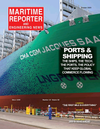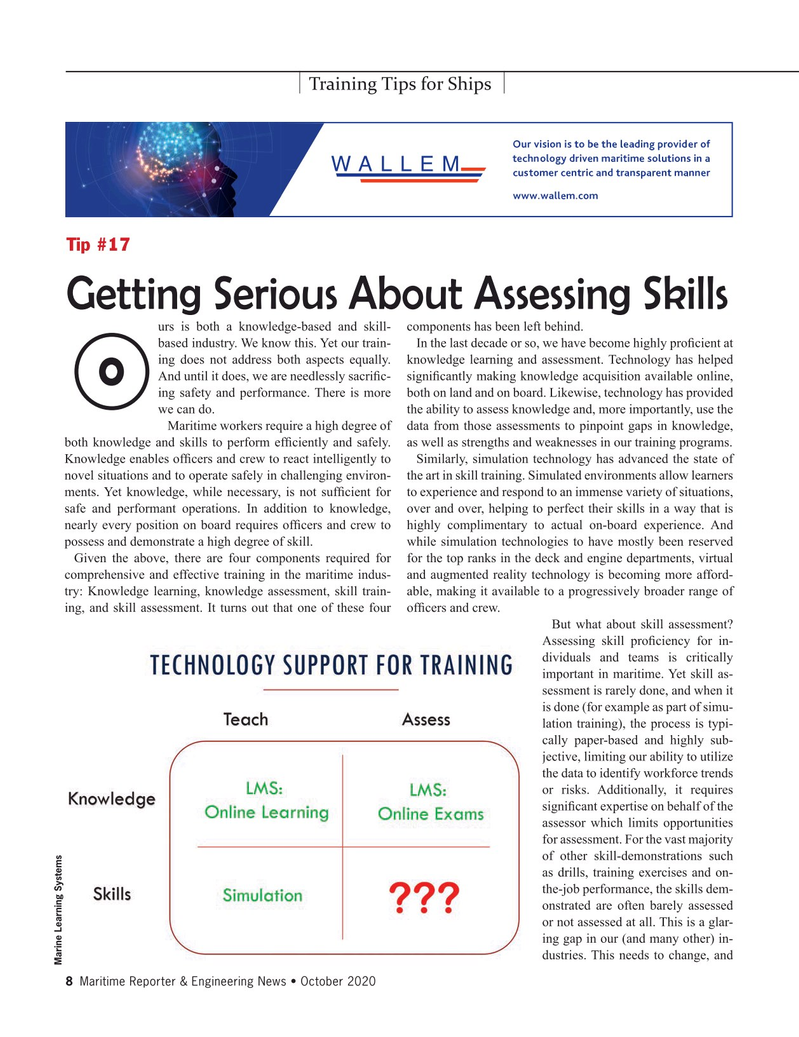
Page 8: of Maritime Reporter Magazine (October 2020)
Shipping & Port Annual
Read this page in Pdf, Flash or Html5 edition of October 2020 Maritime Reporter Magazine
Training Tips for Ships
Tip #17
Getting Serious About Assessing Skills urs is both a knowledge-based and skill- components has been left behind. based industry. We know this. Yet our train- In the last decade or so, we have become highly pro? cient at ing does not address both aspects equally. knowledge learning and assessment. Technology has helped
And until it does, we are needlessly sacri? c- signi? cantly making knowledge acquisition available online,
O ing safety and performance. There is more both on land and on board. Likewise, technology has provided we can do. the ability to assess knowledge and, more importantly, use the
Maritime workers require a high degree of data from those assessments to pinpoint gaps in knowledge, both knowledge and skills to perform ef? ciently and safely. as well as strengths and weaknesses in our training programs.
Knowledge enables of? cers and crew to react intelligently to Similarly, simulation technology has advanced the state of novel situations and to operate safely in challenging environ- the art in skill training. Simulated environments allow learners ments. Yet knowledge, while necessary, is not suf? cient for to experience and respond to an immense variety of situations, safe and performant operations. In addition to knowledge, over and over, helping to perfect their skills in a way that is nearly every position on board requires of? cers and crew to highly complimentary to actual on-board experience. And possess and demonstrate a high degree of skill. while simulation technologies to have mostly been reserved
Given the above, there are four components required for for the top ranks in the deck and engine departments, virtual comprehensive and effective training in the maritime indus- and augmented reality technology is becoming more afford- try: Knowledge learning, knowledge assessment, skill train- able, making it available to a progressively broader range of ing, and skill assessment. It turns out that one of these four of? cers and crew.
But what about skill assessment?
Assessing skill pro? ciency for in- dividuals and teams is critically important in maritime. Yet skill as- sessment is rarely done, and when it is done (for example as part of simu- lation training), the process is typi- cally paper-based and highly sub- jective, limiting our ability to utilize the data to identify workforce trends or risks. Additionally, it requires signi? cant expertise on behalf of the assessor which limits opportunities for assessment. For the vast majority of other skill-demonstrations such as drills, training exercises and on- the-job performance, the skills dem- onstrated are often barely assessed or not assessed at all. This is a glar- ing gap in our (and many other) in- dustries. This needs to change, and
Marine Learning Systems 8 Maritime Reporter & Engineering News • October 2020
MR #10 (1-17).indd 8 10/6/2020 8:32:59 AM

 7
7

 9
9
